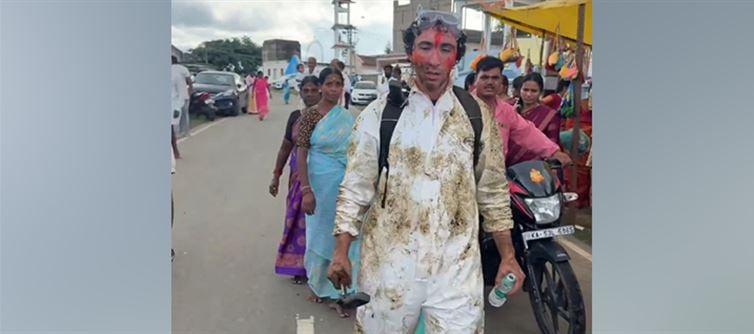
🎬 When the Camera Becomes a Weapon
In the age of viral content, ignorance travels faster than light.
American YouTuber Tyler Oliveira, 25, decided to step into an indian village’s sacred post-Diwali ritual — not to understand it, not to document faith or folklore, but to brand it “India’s Poop-Throwing Festival” for cheap global laughs.
And like countless Western creators before him, he hid behind the thin veil of “curiosity” while peddling colonial disgust disguised as content.
💩 The “Poop Festival” That Wasn’t
The ritual Oliveira filmed wasn’t an exotic sideshow for his subscribers.
It was the Gorehabba Festival, celebrated in Gumatapura, Karnataka, where villagers believe their deity Beereshwara Swamy was born from cow dung — a substance seen as sacred and purifying in Hindu tradition.
What Oliveira chose to portray as filth is, in its cultural context, an act of cleansing and devotion — a symbolic celebration of fertility, earth, and divine renewal following Diwali.
But instead of learning, he mocked.
Instead of contextualizing, he sensationalized.
Instead of respect, he offered ridicule — and then hid behind irony.
💻 Clickbait Colonialism: A Western Tradition
This is not new. Western media and influencers have long treated india as content fodder — a dusty, colorful backdrop for shock thumbnails and exaggerated disgust.
From “Slumdog stereotypes” to “poverty tourism,” the pattern is clear: exoticize the east, monetize the outrage.
Tyler’s hazmat suit and sneering captions (“I went to India’s poop-throwing festival. It was the s***iest experience of my life”) aren’t innocent humor — they’re a continuation of that colonial lens that sees brown culture as bizarre, primitive, and worthy of mockery.
🧠 The Ignorance Behind the Lens
Oliveira’s own defense?
“This is 100% real. I can’t wait to show you a 30-minute version,” he wrote, as indians in his comments section called him out.
One user shot back, “You can record poop in Western countries — plenty on the streets of California.”
He replied smugly, “Don’t be mad, bro.”
But the irony is painful:
The same YouTuber who trivialized India’s rituals comes from a country where mass homelessness, drug crises, and human feces on city streets are recurring realities — yet they’re rarely framed as reflections of “Western civilization.”
🌍 Cultural Context vs. Clickbait Economy
In india, cow dung isn’t “waste” — it’s worship. It’s used to purify homes, coat temple floors, and symbolize the cyclical relationship between humans, animals, and nature.
To an uninformed outsider, it may look strange. But to reduce a centuries-old ritual to a meme is not journalism, it’s mockery.
Social media has blurred the line between documenting and disrespecting. When every act of reverence becomes a viral spectacle, traditions lose their dignity in the algorithm’s churn.
⚔️ The Problem Isn’t Curiosity — It’s Contempt
Tyler Oliveira is not being criticized for filming india — he’s being condemned for framing faith as farce.
He could have educated millions about rural India’s living traditions.
He could have shown the beauty of continuity, where belief survives modernity.
Instead, he wore goggles, flinched for the camera, and reduced the sacred to spectacle.
That’s not cultural exploration. That’s exploitation.
📉 The Pattern of Provocation
This isn’t Oliveira’s first controversy.
Earlier this year, he claimed he “contracted four types of salmonella” during a trip to india — despite eating in five-star hotels — and posted about “serious hygiene issues” in the country.
He’s made videos amplifying misinformation, hoaxes, and moral panic before. Outrage is his oxygen; india was just his latest stage.
🕉️ The Sacred Doesn’t Need Western Approval
The villagers of Gumatapura won’t care what a YouTuber said — they’ll celebrate next year as they always have.
But what’s at stake is bigger: the right to cultural dignity in an era where Western influencers still treat non-Western spirituality as sideshow material.
Every time such videos trend, they reinforce an old hierarchy:
The West as the observer, the east as the observed.
The influencer as narrator, the native as curiosity.
🔥 Final Word: Mockery Isn’t a Documentary
Tyler Oliveira’s “India’s Poop-Throwing Festival” isn’t just offensive — it’s lazy, shallow, and rooted in the worst impulses of viral culture.
There’s a thin line between cultural curiosity and cultural condescension, and he crossed it gleefully.
india doesn’t need validation from YouTubers who come with filters, not humility.
And the next time someone like Oliveira points a camera at a ritual they don’t understand, they should remember:
The world is watching — and this time, we’re not laughing with you.




 click and follow Indiaherald WhatsApp channel
click and follow Indiaherald WhatsApp channel